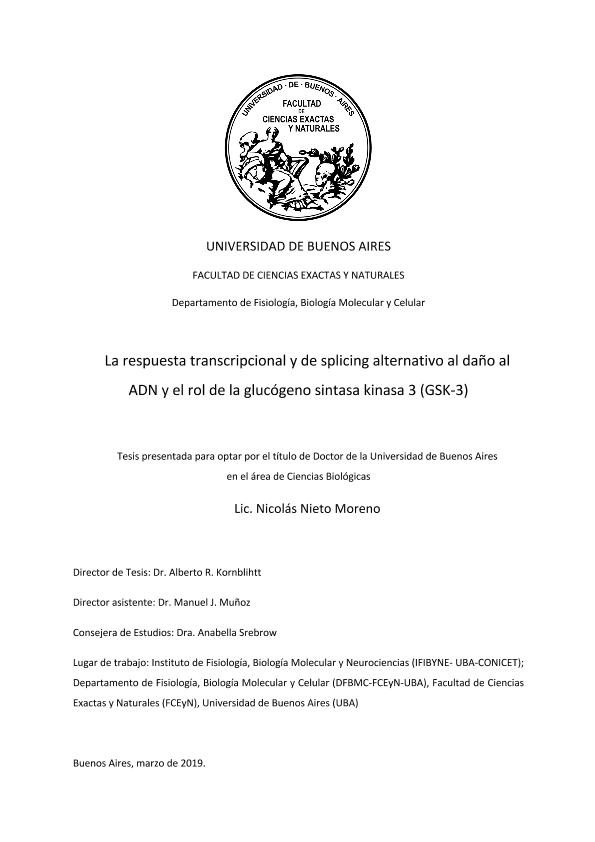Mostrar el registro sencillo del ítem
dc.contributor
Kornblihtt, Alberto Rodolfo

dc.contributor
Muñoz, Manuel Javier

dc.contributor
Srebrow, Anabella

dc.contributor.author
Nieto Moreno, Nicolás

dc.date.available
2019-09-13T16:43:24Z
dc.date.issued
2019-03-25
dc.identifier.citation
Nieto Moreno, Nicolás; Kornblihtt, Alberto Rodolfo; Muñoz, Manuel Javier; Srebrow, Anabella; La respuesta transcripcional y de splicing alternativo al daño al ADN y el rol de la glucógeno sintasa kinasa 3 (GSK-3); 25-3-2019
dc.identifier.uri
http://hdl.handle.net/11336/83543
dc.description.abstract
En esta tesis doctoral estudiamos la respuesta transcripcional y de splicing alternativo (SA) al daño al ADN producido por luz ultravioleta (UV) en células humanas en cultivo. Los CPDs, lesiones en el ADN producidas por la luz UV, y su reconocimiento por el factor de reparación XPE provocan una cascada de transducción de señales mediada por la proteína ATR que finaliza en la hiperfosforilación de la RNA polimerasa II (RNAPII) y en una reducción en su tasa de elongación. Esto produce cambios en los patrones de SA en el marco del modelo de acoplamiento cinético entre la transcripción y el SA.Para identificar qué otros factores vinculan las lesiones en el ADN con la RNAPII desarrollamos un sistema reportero fluorescente de SA que permite conocer la regulación del SA de forma rápida y sencilla: consiste en un minigén inducible que expresa las proteínas GFP o dsRed según se incluya o no un exón alternativo. Con este reportero, realizamos un rastreo con 686 inhibidores de kinasas del Published Kinase Inhibitor Set (PKIS2 library) de GlaxoSmithKline. De los 686 inhibidores analizados, sólo 11 demostraron tener un efecto en la regulación del SA en respuesta a UV. En particular, la glucógeno sintasa kinasa 3 (GSK-3) es un blanco común a 6 de los 11 inhibidores. Por lo tanto, nos centramos en el estudio del rol de GSK-3 en la regulación del SA trabajando con inhibidores altamente selectivos y con células en las que eliminamos la expresión de las isoformas α o β de GSK-3, provenientes de dos genes parálogos, mediante la tecnología CRISPR. Observamos que GSK-3 juega un papel central en la respuesta al daño: la inhibición de GSK-3 previene la respuesta transcripcional y de SA medida a nivel de la hiperfosforilación de la RNAPII, revierte la reducción de la tasa de elongación de la RNAPII e impide los cambios en el SA de genes previamente identificados como genes regulados por la irradiación con luz UV. Además, la inhibición de GSK-3 previene la apoptosis inducida por UV. En conjunto, estos resultados develan un rol central para GSK-3 en la respuesta al daño al ADN inducido por luz UV.
dc.description.abstract
The present doctoral thesis is focused on the transcriptional and alternative splicing (AS) response elicited in human cultured cells upon irradiation with ultraviolet (UV) light. CPDs, DNA lesions provoked by UV irradiation, and their recognition by the repair factor XPE trigger a signal transduction cascade mediated by the protein ATR that ends in the hyperphosphorylation of the carboxy-terminal domain (CTD) of RNA polymerase II (RNAPII) and a decrease in RNAPII elongation rate. The decrease in the elongation rate promotes changes in AS regulation consistent with the kinetic coupling model between transcription and splicing. To identify novel factors involved in the signaling between DNA lesions and RNAPII, we developed an AS fluorescent reporter system which allows us to study the AS regulation in a fast and simple manner: it consists of an inducible minigene that expresses the proteins GFP or dsRed whether an alternative exon is included or not. With this reporter we performed a high-throughput screening with 686 kinase inhibitors from the Published Kinase Inhibitor Set (PKIS2 library) provided by GlaxoSmithKline. Out of the 686 inhibitors analyzed, only 11 showed an effect in AS regulation in response to UV light. In particular, the protein glycogen synthase kinase 3 (GSK-3) showed up as a common target of 6 of 11 of the hits obtained in the screening. Therefore, we centered our study in the role of GSK-3 in the regulation of AS working with highly specific commercial GSK-3 inhibitors and with CRISPR knock-out cells for the two isoforms α or β of GSK-3, encoded by two paralogue genes. We observed that GSK-3 plays a central role in the UV-triggered response: the inhibition of GSK-3 prevents RNAPII hyperphosphorylation, as well as the decrease in RNAPII elongation rate and the changes in AS of previously identified UV-responsive genes. Moreover, GSK-3 inhibition prevents the UV-induced apoptosis. Altogether, these results unveil an important role for GSK-3 in the UV-induced DNA damage response.
dc.format
application/pdf
dc.language.iso
spa
dc.rights
info:eu-repo/semantics/openAccess
dc.rights.uri
https://creativecommons.org/licenses/by-nc-sa/2.5/ar/
dc.subject
Daño al Adn
dc.subject
Transcripción y Splicing Alternativo
dc.subject
Rnapii
dc.subject
Glucógeno Sintasa Kinasa 3 (Gsk-3)
dc.subject.classification
Bioquímica y Biología Molecular

dc.subject.classification
Ciencias Biológicas

dc.subject.classification
CIENCIAS NATURALES Y EXACTAS

dc.title
La respuesta transcripcional y de splicing alternativo al daño al ADN y el rol de la glucógeno sintasa kinasa 3 (GSK-3)
dc.title
The transcriptional and alternative splicing response to DNA damage and the role of glycogen synthase kinase 3 (GSK-3)
dc.type
info:eu-repo/semantics/doctoralThesis
dc.type
info:eu-repo/semantics/publishedVersion
dc.type
info:ar-repo/semantics/tesis doctoral
dc.date.updated
2019-09-12T19:04:20Z
dc.description.fil
Fil: Nieto Moreno, Nicolás. Consejo Nacional de Investigaciones Científicas y Técnicas. Oficina de Coordinación Administrativa Ciudad Universitaria. Instituto de Fisiología, Biología Molecular y Neurociencias. Universidad de Buenos Aires. Facultad de Ciencias Exactas y Naturales. Instituto de Fisiología, Biología Molecular y Neurociencias; Argentina
dc.conicet.grado
Universitario de posgrado/doctorado

dc.conicet.titulo
Doctor en Ciencias Biológicas
dc.conicet.rol
Autor

dc.conicet.rol
Director

dc.conicet.rol
Codirector

dc.conicet.rol
Consejero de estudios

dc.conicet.otorgante
Universidad de Buenos Aires. Facultad de Ciencias Exactas y Naturales

Archivos asociados
